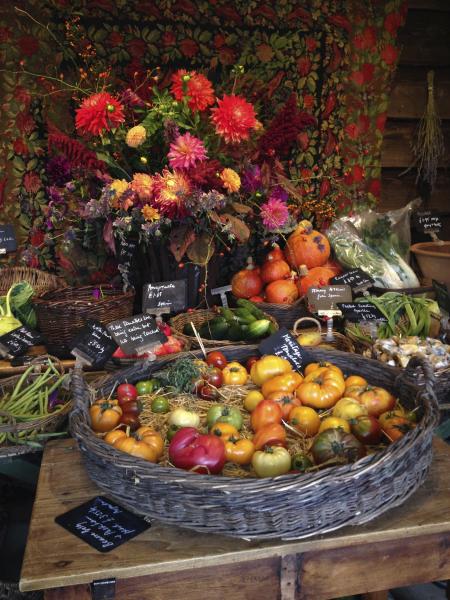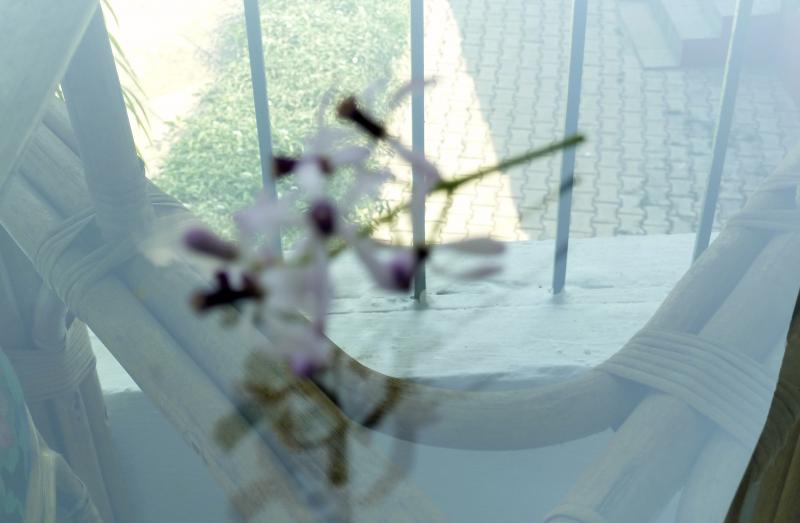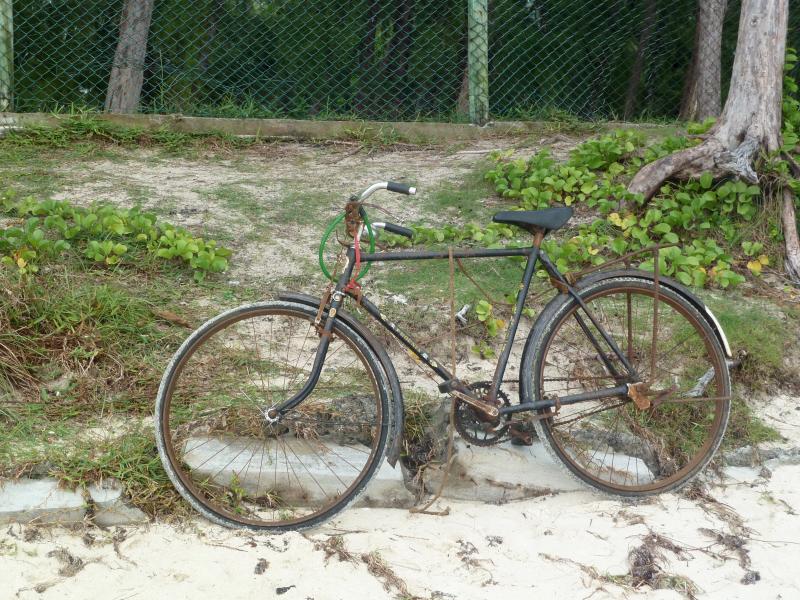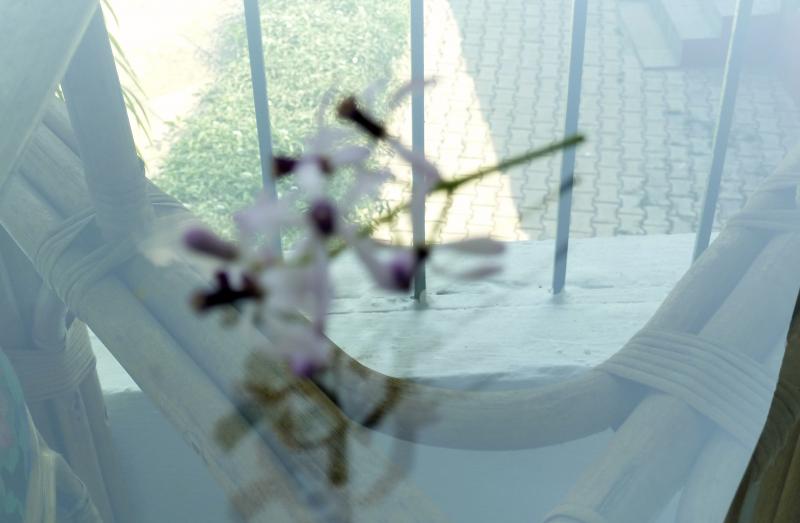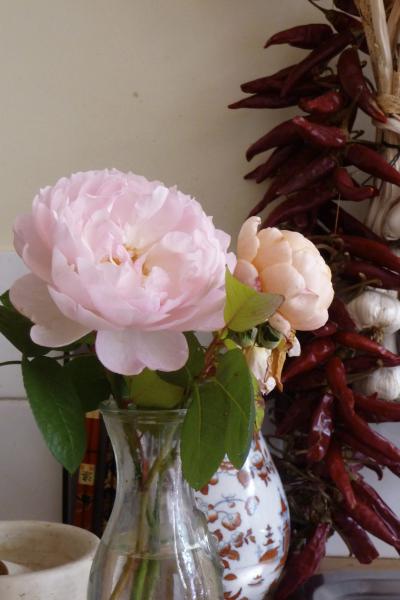
The most important discovery I have made about cooking is this: how my dish turns out depends entirely on whom I’m cooking for. This puts me in the category of amateur cuisinière, because in my book a professional is another sort of creature altogether.
The act of cooking is not about impressing X or Y (that factor generates extra energy, angst etc.) but some other alchemical process which conjures up tinctures of feelings which infuse the dish with subtle (or blatant) intention and flavour. Resentment at having to cook if I’m not in the mood- or if the guest is faddy- is unfailingly betrayed by a resulting blandness. It could be the knowledge that the fish has been in the fridge a day longer than I’d like, or some vital aromatic spice is missing and I feel snagged by compromise. In those circumstances I never really enjoy the result.
It’s a complex business, this hand eye heart tongue smell coordinate, although quite capable of being untangled, if I put my mind to it. Mostly, though, with a degree of confidence and faith in the raw materials and an outlook that is neither sunny nor rancid, things turn out well.
At least this is my creed and hope that the way to a person’s heart is through their stomach. You cook who/what you are.
Let me illustrate. The day I turned left into the potholed track off the Route Nationale 119 that goes up to Benoit’s cabin and pulled up outside it: I could see him from the parked car through an open window beavering away at his papers. Naturally, I was a little put out that he didn’t look up and wave, smile or acknowledge me. I hadn’t seen him for a year.
I walked to the side door, leaving my case by the car, thinking he can jolly well carry it inside for me. But then he came to the door in his laid-back way, smiling his half-smile and apologizing in his minimalist manner. A Gallic shrug, “Sorry, had to finish the accounts.” And in order to make me feel immediately at home he adds, “I thought you’d like to make dinner tonight.”
This, I knew, was partly because of his innate laziness, rather than a deficiency of hospitality, and partly by way of a compliment; he loves my cooking and we’ve always enjoyed the experience of eating together. Especially when I’m the cook and he’s the washer-upper. It’s a pleasure for me because he so relishes his food. When he dips his breakfast tartine– topped by with an inch of his own fig jam- in his cup of coffee he is unashamedly gluttonous. “Je suis gourmand,” he’ll declare, wiping his mouth.

So I looked over his supplies: good fresh eggs tarred with chicken dirt from Catherine’s farm, a bouquet of salad from Geraldine’s smallholding, a perfectly ripe avocado from the Bio Co-op, a small piece of Tôme made with Ignazy’s sheeps’ milk and half a loaf of chewy rye from Eric’s bakery. All the food came from people we both knew in the Pyreneean Conflent. So I put together a green salad with avocado and olive oil (local) as it wasn’t the season for tomatoes or much else. Then we each had a three-egg omlettte , fragrant with fresh butter, fluffy because I’d partially beaten the whites, and afterwards we nibbled a small piece of Ignazy’s cheese with some grapes and a piece of rye bread. We shared a bottle of Vin du Garage, made by someone he knows, heavily perfumed with warmed plums and blackberries. For afters he broke bits of bitter chocolate to offer me. For such an understated and effortless meal it felt utterly satisfying and I slept well after my long journey.

As I said, we both knew the producers and something of their lives. The lean and handsome shepherd Ignazy and his proud Spanish wife, Montzy, whose blonde hair suggested Visigoth ancestry, had been my neighbours. Catherine, who had the egg stall at the market and put up with her husband’s randiness. A little fellow with a grizzled beard, he tried it on with my friend Blanche. He invited her to a ride on his tractor when he was ploughing and made her sit between his legs on the front seat. She was too polite- or too taken aback- to climb down. That network of connections, like a geography of veins and capillaries, from what we knew about the producers’ lives and families, their farms and habitats, the different ways they talked to us customers, their independence from Monsanto type methods, and their beetroot, apples, lettuces, yoghurt, ran a course to our stomachs in a unique way.

The butter and avocado came from the Bio-Coop which was the only decent shop in town, efficiently run by a tomboyish German woman with an obscure Hindu name. The Bio-Coop is what the name suggests, a wholefood co-operative; it was fresh-smelling and clean, fitted out with pine, a nice play area with wooden train-sets and books for children while their parents filled wicker trolleys. The goods weren’t the cheapest, but all the fruit, the vegetables and some of the dairy were locally sourced. The shelves were stacked with exotic grains and flours like stone-ground spelt, black and red quinoa and wild rice, dried mulberries, tigernuts, a variety of delicious but wholesome biscuits, pasta and hard-to-come-by virgin oils and some local cheeses, saucisson and pate, all sourced from the neighbouring area.
On Saturdays shabby looking hippies descended from the mountains in their biscuit boxes on wheels especially as the co-op chimed with high-minded ideals of fair trade and bio farming; it was the acknowledged rendezvous for the many who’d exiled themselves to these remote parts. At the entrance, where the surprisingly sleek glass doors opened soundlessly, an information board greeted one with ads for yoga, Tai.Chi, massage, psychotherapy, second hand vans, house-hunters and so forth. On Saturdays it stayed open all day, not closing for the two-hour lunch but the till rang to a steady footfall of shoppers and a man manufacturing his own spirulina set up a stall in the glassed-in lobby. Right outside grew an orange tree bright with fruit in season.
You could say the Bio Co-op was the nearest thing to a religious gathering place in Prades, with even a down and out waiting hopefully by the door. “J’ai faim.”
But going back to Benoit. One time in his life he’d been deeply influenced by Ayurveda, the Hindu philosophy of health and well-being. He cooked, not in olive oil but ghee, which came in a tin from an Asian shop in Perpignan, the far-off big town. He used cumin, turmeric and coriander seeds and ate penitential bowlfuls of basmati rice and vegetable curries- pumpkin, courgette, potato.
“This is sattvic food” he said. “Pure and simple.” At the time he carried an air of austerity, almost monk like and self-denying. He looked clean, his eyes far-away, almost visionary, and wore a lot of white and faded cotton. At the time he was being sparing with strong coffee and careful with red wine.
Then something changed. All his life he’d been a bachelor, becoming fond of a woman for a few years before moving on. Now he met someone whom he decided might become his partner for life. One reason was because he’d become more sociable and outgoing. He’d discovered a singing voice and rather liked to get on stage and sing sad gospel music. It released some of his Jewish melancholy and gave him a public face. So when he met his new girlfriend, he started reaching out. And when he didn’t need to be a solitary any longer, his eating habits changed.
The fanaticism of Sattvic food gave way to chunky steaks and chops. The simple layout of his kitchen altered. A new stove, a dishwasher, an orange coloured Smeg fridge, a refrigerated wine cooler. He wasn’t eating and drinking now to please himself, but someone else in addition.
Money wasn’t a problem. He’d inherited office blocks in Toulouse, so he escorted her to the very few restaurants, where one didn’t mind parting with a few euros: the fancy place up in Taurinya where the chef experimented with froths and squiggles and bonne bouches. The very self-conscious arriviste restaurant in Ille sur Tet which boasted the youngest chef in the region and then the café which should have outshone them all but didn’t.
It was called L’Escargot Dècontracté, or the Relaxed Snail, or the Lazy Snail. The owners were an Irish couple, where she cooked and he served. She was a sorceress in the kitchen who rarely needed to look up her spells. If she had a mound of potatoes, a bunch of parsley and basil, she would create a plate of dry, crisply sautéed peppery spuds with a dollop of green pesto on the side. Unglamorous, homely even, but mouth-wateringly good.
She made fragrant chicken soup with the tenderest of spring vegetables, small fat dumplings bobbing in the deep bowl, a green and red spiced tabbouleh of barley and pomegranate seeds, meatballs with a thick winey prune sauce, crunchy Vietnamese spring rolls and a melting cheesecake with Claudine’s goats cheese and perfumed unwaxed lemons from Spain.
The husband and wife seemed to have a quarrel on perpetual slow simmer. She would look daggers at him and he’d avenge himself by never smiling at the customers and almost- but not quite- acquainting them with his burden of suffering. I don’t think he liked being in the Pyrenees. He had a bleary unwashed face and started a beard, which made him even less appetising. But he was tolerated because of Dolly’s genius. She was clearly irritated by Vincent and how she managed to produce meal after delicious meal for the small, loyal clientele intrigued us all. Snarling and snapping under her breath made me think of a grinding peppermill and he seemed to make no effort to appease her. And yet her bile never affected the dishes, which it should have done according to my cooking philosophy.

They too had access to the same market gardeners, the same Bio-Coop but with the identical raw materials accessible to everyone in the valley she would conjure up magic. One day when Benoit was mopping up the dregs of a fish soup laced with aioli with a piece of Eric’s sourdough, he was joined at his table by Dolly. She was always aware of the diners, because the kitchen was open-plan with no separation between the tables and hobs. It was the tail-end of the lunch hour and the other regulars had left for their offices and other jobs. Benoit was on his own as the girlfriend had gone to the dentist in Perpignan.
“Magnifique”, he declared, laconically. For once Vincent wasn’t glowering in the background. He’d gone to collect their van from the garage.
Benoit crumpled the linen napkin, brought from Ballymena, and placed it with an air of finality and sufficiency on the table.
“Really? That’s so sweet of you.”
“No, I mean it,” smiling his half-smile, disarming in one so laid-back and seemingly indifferent.
She wasn’t tangling with her irritation that afternoon and he noticed the curve of her mouth, her eyes and her curly red hair.
“Were you a chef before you came to France?”
“I trained under the Roux brothers in London. ‘Le Gavroche’. Heard of it?”
“Of course. What brought you here?”
She sighed. “Money problems. But it was a time when I was trying to get to the beginning- you know- of the supply chain. I wanted to find a direct link between me, the creator of what you are eating, and all the other creators.”
“And your husband? Does he share your views?”
“Oh Vincent. Not in the same way. He’s interested in the accounts and the logistics of the business.”
“While you are the artist.”
“Oh, I don’t know” she said in her delicious brogue.
Benoit fell for the borage-blue eyes, the carroty hair, the dusting of freckles like nutmeg on a brioche and butter pudding and she fell for his emollient easy-going charm, his clean shaven cheeks, his unflappability.
She insisted on keeping it secret from Vincent, so Benoit was also obliged to hide the liaison from his girlfriend and would-be partner. Dolly and Vincent had a lot at stake, having sold up everything in Ballymena to move to France. They’d invested all their money in a house in Prades and in the café. Also, Beth and Morris, their children, were now speaking French fluently and fitting in with their local friends’ lives. To alter any of it would mean a major upheaval all round. With her pioneer spirit Dolly was determined to keep things going as before, but now there was the thrill of forbidden fruit which made her heart sing and every now and again she’d hug herself inwardly with joy and some glee.
Benoit came to have his lunch at L’Escargot Decontracte at least three times a week. At the beginning of the affair everything was as before. Dolly argued with Vincent, Vincent trailed his long face from table to table, irritating people who’d come to relax. Dolly was having a marvellous time behind his back. She and her lover managed to disappear for an hour or two and make love in the back of his station wagon whenever the opportunity arose. She’d never been so happy in all her life, Benoit being a kind of triumphant testament to her cooking, but she was careful not to show it in public and certainly not in front of Vincent.
However, happiness had a contrary effect on her cooking. Instead of her vie sentimentale inspiring her to newer heights, her skills (imperceptibly at first) started to falter. Soups were over-salted, the lasagne leathery, salads under- dressed and wilted and puddings without finesse or character.
One by one the faithful regulars stopped and then Benoit decided that an Irish woman was too fiery for him, too foreign, too unpredictable. He was no longer in love with Dolly and some of it was due to the fact that she had lost the magic touch that made him happy, thoughtful, wistful. And as he was quite literary, he resented discarding the Proustian air that had clung to him.
Being in love hadn’t made Dolly’s cooking more but less sublime; it had created the opposite effect to my hypothesis. But I still think it proved something. The avalanche of love that she experienced had overcome her, burying her other passion under its force. In conclusion I am forced to admit that even a professional chef is influenced by extraneous factors. You cook what you are and sometimes it leads you all the way out of a man’s heart.













